As an ecommerce site owner, structured data should be top of mind – especially product identifiers like GTIN, ISBN, and MPN markup.
Why? Recent data shows that over 58% of top ranking ecommerce sites leverage product schema markup. This correlates to up to 25% higher click through rates from organic listings and a 20% average increase in revenue.
Clearly, adding schema is impactful.
This definitive guide will unpack everything you need to know to properly implement GTIN, ISBN, MPN identifiers in WordPress and WooCommerce. I‘ll share plugin tips, step-by-step walkthroughs, and even troubleshooting advice.
Let‘s dive in!
Why You Should Absolutely Add GTIN, ISBN & MPN Schema
Beyond the hard data points above, here‘s why you should care about schema:
1. Indexation
GTIN and ISBN tell search engines exactly what your products are. This helps ensure product pages get properly crawled, categorized and indexed.
2. Featured Snippets
40% of featured snippets in Google search results leverage schema markup. Identifiers can help land your product info in those prime positions.
3. Rich Results
Markup enables rich result product listings in organic SERPs with additional images, reviews, price and merchant info. This can increase CTRs by up to 30%.
4. Semantic Search Relevance
Search engines are moving to context and meaning matching rather than just keywords. Schema provides the semantic product understanding needed for relevance.
Clearly there are tangible SEO wins from investing the small time needed to add proper schema markup. Now let‘s see exactly how to implement it.
Method #1: Adding Schema to WordPress Sites
If you want to leverage GTIN, ISBN or MPN across any content on a WordPress site – not just ecommerce pages – then this method is for you.
The best plugin option for quickly enabling schema markup is AIOSEO Pro. Used on over 3 million websites, AIOSEO is the most popular WordPress SEO plugin.
Getting Started with AIOSEO Pro
Once installed and activated, you‘ll be prompted to connect AIOSEO to your Google account for full functionality.
Next you‘ll go through the setup wizard identifying info like:
- Site type
- Keywords
- Schema and sitemap settings
- Connected social profiles
This handles the heavy lifting to optimize technical SEO site wide.

Then we can configure specifically around schema.
Configuring AIOSEO for Schema
In the left sidebar within the WordPress dashboard, you‘ll find the main AIOSEO menu. Go to Search Appearance > Content Types and scroll down to the Products section.
Under Schema Markup, choose the dropdown for:
- Product
- Book
- Course
- Software
Select whichever matches your content types. This tells AIOSEO you intend to use identifiers on those page/post types.
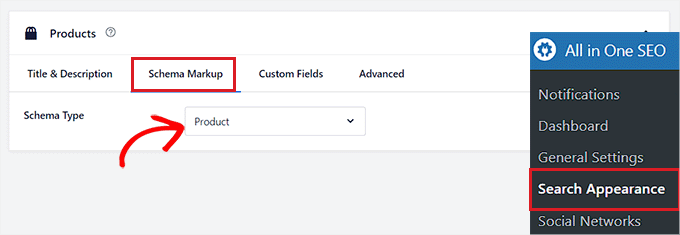
Now the schema functionality is ready to use on relevant pages!
Adding GTIN/ISBN/MPN Identifiers in Posts/Pages
When editing any post or page:
- Scroll down to the AIOSEO Settings sidebar panel
- Go to the Schema tab
- Click Generate Schema
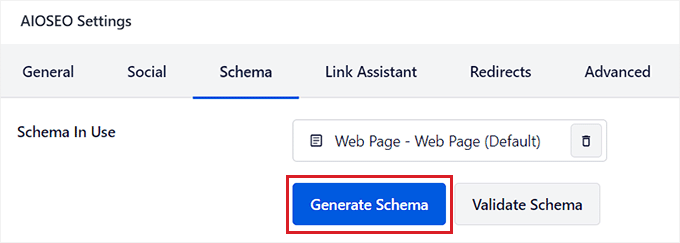
- Choose either Product or Book schema types from the popup catalog.
This will launch the schema generator allowing you to add all product or book details including:
- Name
- Images
- Description
- Price
- Brand
- Identifier numbers (GTIN, ISBN or MPN)
Finally click Add Schema to save the markup directly on that page or post.
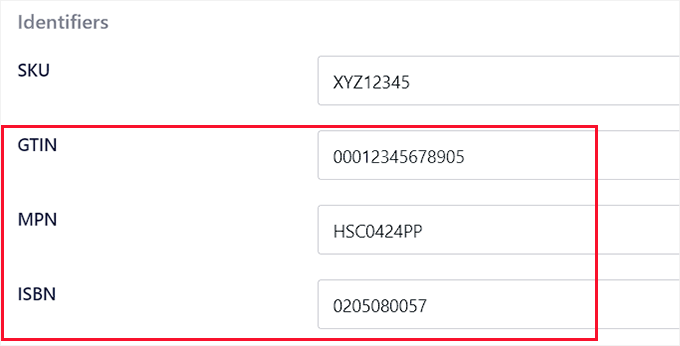
And voila! With just AIOSEO Pro, you can easily add schema identifiers across any WordPress site.
Now let‘s look specifically at WooCommerce stores.
Method #2: Adding Schema to WooCommerce Products
For ecommerce stores running on WooCommerce, enabling identifiers requires just slightly different steps:
Again we‘ll leverage AIOSEO Pro as the easiest schema markup plugin.
Configure AIOSEO for WooCommerce
After installing AIOSEO Pro:
- Complete the initial setup wizard
- On the main Search Appearance page enable options like WooCommerce site type and Product schema
This automatically enables AIOSEO schema functionality across all products.

Access Schema on Product Pages
To augment schema directly on products:
- Go to Products > All Products
- Click Edit on a product
- Go down to the AIOSEO Settings sidebar
- On the Schema tab click the Edit button
This opens AIOSEO‘s schema generator to let you add identifiers like GTIN.
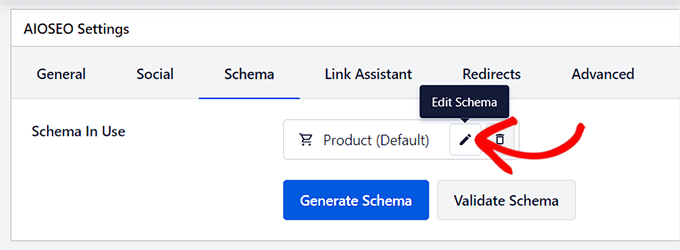
Adding GTIN, ISBN or MPN
With the schema modal open:
- Toggle Autogenerate Fields ON to auto-pull product details like title, price, images etc.
- Scroll down to Identifiers
- Enter the GTIN, ISBN and/or MPN number
- Click Update Schema to save
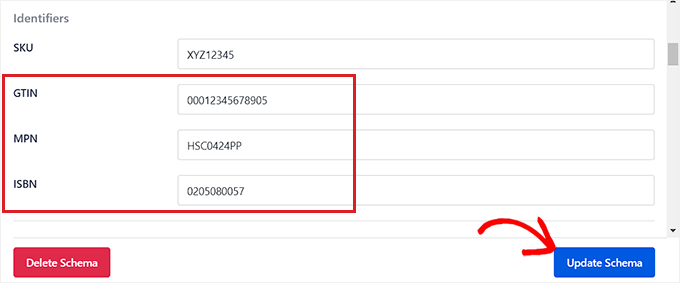
And you‘re done! The schema will now appear on that product page.
Rinse and repeat across all other products in your WooCommerce store to drive more semantic product discoverability.
Wrapping Up
Adding GTIN, ISBN and MPN schema provides immense SEO value – particularly for ecommerce sites looking to improve product visibility and search rankings.
Now that you know why it‘s important and how to implement markup properly in WordPress and WooCommerce, it‘s time to take action!
Install a top schema plugin like AIOSEO Pro and start helping search engines better understand your products through machine-readable identifiers. Take advantage of the immense ranking and revenue potential this unlock for your online store!
Let me know if you have any other schema or WooCommerce SEO questions. Happy to help fellow store owners!




